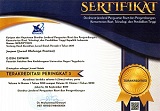Diving Skill's Coaching Upaya Pemberdayaan Para Relawan Search and Rescue di Surakarta
DOI:
https://doi.org/10.21831/jorpres.v15i2.29508Keywords:
SAR, relawan, keterampilan menyelam, Search and Rescue, volunteers, diving skills coachingAbstract
Usaha untuk memberdayakan masyarakat agar mereka lebih kreatif dan produktif untuk meningkatkan taraf hidup gencar digaungkan oleh pemerintah. Pemberdayaan masyarakat merupakan proses pembangunan dengan inisiatif dari masyarakat untuk memulai kegiatan dalam upaya memperbaiki situasi dan kondisi yang dihadapi. Relawan adalah sebuah aktivitas yang dilakukan secara mandiri oleh personal maupun kelompok yang didasari atas kemauan sendiri untuk membantu sesama yang membutuhkan pada saat keadaan darurat atau bencana. Di luar kegiatan Search and Rescue (SAR), relawan tidak memiliki aktivitas lain yang produktif, untuk meningkatkan kesejahteraannya. Diving Skill's Coaching adalah salah satu upaya untuk memberdayakan para relawan dengan membekali mereka keterampilan menyelam. Keterampilan tersebut dapat mendukung profesionalismenya sebagai relawan SAR, sekaligus mereka dapat memanfaatkannya dalam berbagai aktivitas lain yang bersifat produktif seperti sebagai life guard, pemandu wisata baik wisata pantai, sungai atau waduk, dan pekerjaan yang lain yang menuntut skillls tersebut.
Diving Skill Coaching efforts to empower search and rescue volunteers in surakarta
Abstract
Efforts to empower the community to be more creative and productive to improve the standard of living of the people are intensively carried out by the government. Community Empowerment is a development process with the initiative of the community to start activities in an effort to improve the situations and conditions encountered. Volunteers are activities that are carried out independently by individuals or groups based on their own desire to help others who are in need during emergencies or disasters. Outside Search and Rescue (SAR) activities, volunteers do not have other productive activities, to improve their welfare. Diving Skills Training is one of the efforts to empower volunteers by providing their diving skills. These skills can support their professionalism as SAR volunteers, while they can utilize them in various other productive activities such as life guards, tour guides, beach, river or reservoir tours, and other occupations that demand these skills.
References
American Academic of Pediatric Commite on Injury and Poison Prevention Drowning. (1993). Infant, Children, and Adolescents. Pediatrics.
American Red Cross. (1992). Water Safety Instructor's Manual, Infant Preschool aquatic Program. St Louis, MO: CV Mosby.
Ardana, Komang. Mujiati, N.W. Sriathi, A.A. 2008. Perilaku Keorganisasian. Cetakan Pertama. Graha Ilmu.
Clement A. (1997). Legal Responsibility in Aquatics. Aurora, OH: Sport and Law
Palmer, Lynn. (2005). Safe Swimming. Parks & Recreation; Feb 2005; 40, 2; ProQuest Education Journals page. 64
Persatuan Olahraga Selam Seluruh Indonesia (1980), Persyaratan dan Persatuan Dasar Selam Olahraga Indonesia. Jakarta: PB POSSI.
Sismadiyanto, Susanto, E. (2009). Pelatihan Dasar-Dasar Keamanan Air bagi Pengawas Kolam Renang (Lifeguard) Se-DIY. Yogyakarta: FIK UNY. http://staffnew.uny.ac.id/upload/ 132300165/penelitian/8.+Pelatihan+Dasar-dasar+Keamanan+Air+bagi+Pengawas+Kolam+Renang+(lifeguard),+Jurnal+ INOTEK,+Volume+13,+ Nomor+2,+Agustus+2009_0.pdf
Swimming Teaching Association (2001). First Aid for Drowning (http://www.sta.co.uk/catalog. com)
Syahriati, Elida. (2013). Kinerja Relawan yang Berafiliasi pada Organisiasi Non Profit (Lembaga Sosial Kemanusiaan). Yogyakarta: Universitas Gadjah Mada.
Downloads
Published
How to Cite
Issue
Section
License
Authors who publish with this journal agree to the following terms:
- Authors retain copyright and grant the journal right of first publication with the work simultaneously licensed under a Creative Commons Attribution License that allows others to share the work with an acknowledgement of the work's authorship and initial publication in this journal.
- Authors are able to enter into separate, additional contractual arrangements for the non-exclusive distribution of the journal's published version of the work (e.g., post it to an institutional repository or publish it in a book), with an acknowledgement of its initial publication in this journal.
- Authors are permitted and encouraged to post their work online (e.g., in institutional repositories or on their website) prior to and during the submission process, as it can lead to productive exchanges, as well as earlier and greater citation of published work (See The Effect of Open Access).




